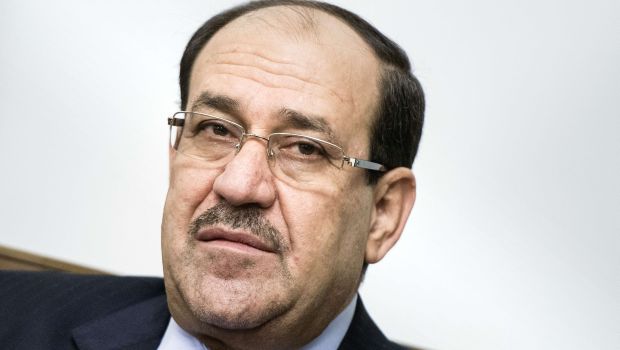
(FILES) – A file picture taken on June 23, 2014 shows Iraqi Prime Minister Nuri al-Maliki meeting with US Secretary of State (unseen) at the Prime Minister’s Office in Baghdad. (AFP PHOTO/POOL/BRENDAN SMIALOWSKI)
The pressure comes amid continuing infighting within the National Alliance, the wider Shi’ite political grouping of which Maliki’s State of Law is a member.
A senior member of the coalition, MP Sadiq Al-Labban, told Asharq Al-Awsat that the next prime minister should be a member of the coalition because it won the largest number of seats in April’s parliamentary election.
Maliki’s bloc won 92 seats, short of the 164 needed for a majority, though he continues to push for a third term in office.
Labban said: “The talk about an alternative for Maliki from the State of Law coalition is a game intended to create a state of chaos within the coalition. Therefore, our stance is clear, which is that we do not have an alternative to Maliki.”
Labban’s statement follows a call on Saturday from the leader of the Sadrist Movement—also a part of the National Alliance—Moqtada Al-Sadr, who also said that State of Law had the right to nominate a prime minister, but was opposed to a third term for Maliki.
However, negotiations within the National Alliance have reportedly been complicated by calls from Kurdish and Sunni leaders for Maliki to step down, and for a reshaping of the Iraqi political system in the wake of the advance of the Islamic State of Iraq and Syria (ISIS) and its allies across much of the country.
A senior source in the National Alliance close to the Sadrist Movement told Asharq Al-Awsat that the Alliance—which by itself has enough MPs to form a government—was worried about an overall decline of its power.
Speaking on condition of anonymity, he said: “The [National Alliance] does not want to be a hostage to the will of the other partners, who interfere in its internal affairs by setting conditions to whom they will accept or not as prime minister.”
“There is a feeling within the National Alliance that the Kurdish and Sunni brothers started talking about a new reality after the control by ISIS of Mosul and Tikrit. This means they are exercising a kind of arm-twisting of the National Alliance under the pretext of their rejection of Maliki,” he added.
The source also said there were fears that putting too much pressure on State of Law could damage the National Alliance as a whole.
“There is keenness not to provoke the State of Law coalition in a way that could lead to the collapse of the National Alliance, whether in the event of the departure of the coalition from the alliance or the departure of the National Coalition, represented by the Sadrist Movement and the Islamic Supreme Council of Iraq (ISCI), from the alliance. This is because this will mean the end not only of the largest bloc, but also of the Shi’ite role as an influential force in the political map of the country,” he said.
The source also said that the Iranian government, which played a key role in securing a second term for Maliki in 2010, was pushing for the National Alliance to remain united.
He said: “Iran is pressing for Shi’ite ranks to remain strong to face a common danger, regardless of the current stance on Maliki . . . The Sadrist Movement is the only one that rejected such pressures, while this view has started to have an impact on the rest of the components of the alliance, including the ISCI, despite its rejection of Maliki’s bid for third premiership in principle.”
Meanwhile, opposition to Maliki remains strong across the rest of Iraq’s political spectrum. The Kurdistan Alliance and the Sunni Iraqi Forces Alliance, in addition to the secular Wataniya bloc led by Iyad Allawi, have sent clear signals that they will not participate in any government to be headed by Maliki.
In a statement to Asharq Al-Awsat, Issam Al-Obaidi, a leading figure in the Iraqi Forces Alliance, said: “What is important to us is the peaceful rotation of power. We have expressed this in plain terms when the leader of Mutahidoun and former parliament speaker Osama Al-Nujaifi announced he was abandoning his bid for the Speaker’s post, although he is an acceptable figure for all Sunni blocs as well as the other forces, such as the Kurds and the National Alliance, except the State of Law coalition. He is unlike Maliki, who is rejected by all, except Iran and the State of Law Coalition.”
Obaidi added: “The ball is now in the court of the National Alliance. If they wanted to press ahead with the formation of a national unity government that is accepted nationally, they have no other option but to push Maliki aside. Otherwise, we will not participate in a government involving Maliki, although we have our candidate for the parliament Speaker post: Salim Al-Jubouri, in addition to Zafer Al-Aani, both of whom are acceptable figures for all.”
In a statement to Asharq Al-Awsat, Muayyid Tayyib, a senior figure in the Kurdistan Alliance, said: “All that we can say is that if Maliki stayed on as prime minister we should bid farewell to one Iraq.”
“For Iraq to remain united or not now hinges on whether Maliki will stay or leave his post. Therefore, our stipulation to participation in government and to putting forward our candidate for the presidency is related to an outright and clear decision from the National Alliance to exclude Maliki and field another candidate. We will accept any candidate other than Maliki,” he added.
